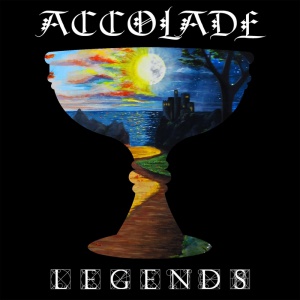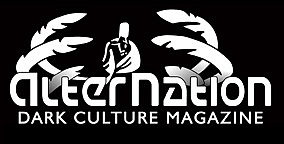Accolade - Legends

Reads: 3542 times
70%
Perhaps there is no greater compliment for American band drawing from the Celtic tradition than to say that, their music is steeped throughout with European character. This is just in case of Accolade’s album, inspired by a visit at Chalice Well in Glastonbury, almost a personification of a pagan myth.
"Legends" sounds like a combination of Loreena McKennitt with The Breath of Life, medieval has its own hieros gamos with gothic rock, you can also search for influences from Dead Can Dance, both in extremely gentle, but piercing classical soprano of the female vocalist, as well as in global inspirations - because although the main theme of the album are Arthurian legends and associating with them motives, already "Hymn to the Moon Goddess" is version of the oldest song known in the world, which was written on the tablets found on grounds that belong now to Syria. It is worth mentioning that most of used numerous instruments was recorded "live". Whole sounds at the same time as removed from the 80’s and could certainly become one of the most emblematic examples of 4AD’s music in their peak period.
Unbridled, piercing magic, communication with history and nature, with fantastic legends from the Middle Ages, characterize the album from the first notes of "Gelfling Song", a kind of entry with the sound of rain, with conveying to a different dimension, to another time chants and with significant to all the material rhythms punched by djembe. This is just one of the means, by which the climate of Camelot is achieved – except distinctive the most mandolin, tambourine and trumpet, we have the opportunity to hear, among others, e.g. horn ("Elf King"), harp and piano ("The Lady of Shalott").
First part of the album almost entirely (excluding keyboards and percussion) uses the typical minstrel instruments. Lively "Elf King" is steeped most with atmosphere of the Middle Ages, and construction of the composition with bright, vocal shining like sun reflections in the waters of the forest’s brook that makes, the recipient has an impression, as if he was on the market of the former settlements, listening to ballads of a wandering troupe. Only the modern form of the language reminds of its true origin.
In "Hymn to the Moon Goddess" Stefanie explores even higher, almost to the limit, sounds from the scale of her voice, using it as an instrument in a way that it sometimes merges into one pervasive wave with lyre and the rest of her companions. Fair instrument for torture, when you are made of glass. But this track is mainly just a huritian’s curiosity from 3,400 years before in new interpretation, and as such definitely gives a way for other components of the album.
Although "The Journey" does not go away entirely from the climate (elements of Arthurian’s mysticism in the text, tambourine, mandolin), it differs significantly from what has been so far presented on the record. Despite the fact it starts quite ethereal, you can hear bass guitar, and when flourishing, gentle singing goes silent for a moment, melody starts to be led by an acoustic guitar, right after motoric percussion drives the rhythm and prog-rock nature explodes with first time utterance of electric guitar that until the end leads vigorous, but melancholic composition. It supplements along with a guest male vocal subtle soprano and construction based on repetitions of guitar’s parts and close to the beginning track - with organs in the background.
A real treasure on "Legends" is undoubtedly "The Lady of Shalott" - interpretation of the famous poem from lord Alfred Tennyson based on the Arthurian tale, romantic story about Ophelia's predecessor. Progressive, over a twenty minute track is divided into 4 parts in accordance with action of the poem and along with its dramatic construction it builds an appropriate voltage through a variety of musical resources. Each part is different by used rhythms, melody, atmosphere, used instruments belonging to rock music and music of medieval. So we have balanced mood, then melancholy, bitter happiness of love and liberation, and finally tragedy of forthcoming death. But everything remains consistent, and ratio between the various components is perfectly imposed, harmony celebrates its triumphs. Vocal lines flawlessly fit into the lyric’s rhythm, and with the approaching end of composition changes are becoming more frequent and more dramatic. Words make music authentic – and conversely. "The Lady of Shalott" is a result of the majority of previously used instruments and those giving sound for the first time, such as the harp. Loreena McKennitt fans will find pleasure in comparing her style with the version of Accolade.
Troubadour like, romantic blend of band with meaningful name, allows you to move there and then, where and when world was ruled by magic, not by money’s magic, and the concept of the Round Table was not yet morally distorted. That is a good cure for the surrounding reality.
Tracklist:
01. Gelfling Song
02. Elf King
03. Hymn to the Moon Goddess
04. The Journey
05. The Lady of Shalott
Other articles:
"Legends" sounds like a combination of Loreena McKennitt with The Breath of Life, medieval has its own hieros gamos with gothic rock, you can also search for influences from Dead Can Dance, both in extremely gentle, but piercing classical soprano of the female vocalist, as well as in global inspirations - because although the main theme of the album are Arthurian legends and associating with them motives, already "Hymn to the Moon Goddess" is version of the oldest song known in the world, which was written on the tablets found on grounds that belong now to Syria. It is worth mentioning that most of used numerous instruments was recorded "live". Whole sounds at the same time as removed from the 80’s and could certainly become one of the most emblematic examples of 4AD’s music in their peak period.
Unbridled, piercing magic, communication with history and nature, with fantastic legends from the Middle Ages, characterize the album from the first notes of "Gelfling Song", a kind of entry with the sound of rain, with conveying to a different dimension, to another time chants and with significant to all the material rhythms punched by djembe. This is just one of the means, by which the climate of Camelot is achieved – except distinctive the most mandolin, tambourine and trumpet, we have the opportunity to hear, among others, e.g. horn ("Elf King"), harp and piano ("The Lady of Shalott").
First part of the album almost entirely (excluding keyboards and percussion) uses the typical minstrel instruments. Lively "Elf King" is steeped most with atmosphere of the Middle Ages, and construction of the composition with bright, vocal shining like sun reflections in the waters of the forest’s brook that makes, the recipient has an impression, as if he was on the market of the former settlements, listening to ballads of a wandering troupe. Only the modern form of the language reminds of its true origin.
In "Hymn to the Moon Goddess" Stefanie explores even higher, almost to the limit, sounds from the scale of her voice, using it as an instrument in a way that it sometimes merges into one pervasive wave with lyre and the rest of her companions. Fair instrument for torture, when you are made of glass. But this track is mainly just a huritian’s curiosity from 3,400 years before in new interpretation, and as such definitely gives a way for other components of the album.
Although "The Journey" does not go away entirely from the climate (elements of Arthurian’s mysticism in the text, tambourine, mandolin), it differs significantly from what has been so far presented on the record. Despite the fact it starts quite ethereal, you can hear bass guitar, and when flourishing, gentle singing goes silent for a moment, melody starts to be led by an acoustic guitar, right after motoric percussion drives the rhythm and prog-rock nature explodes with first time utterance of electric guitar that until the end leads vigorous, but melancholic composition. It supplements along with a guest male vocal subtle soprano and construction based on repetitions of guitar’s parts and close to the beginning track - with organs in the background.
A real treasure on "Legends" is undoubtedly "The Lady of Shalott" - interpretation of the famous poem from lord Alfred Tennyson based on the Arthurian tale, romantic story about Ophelia's predecessor. Progressive, over a twenty minute track is divided into 4 parts in accordance with action of the poem and along with its dramatic construction it builds an appropriate voltage through a variety of musical resources. Each part is different by used rhythms, melody, atmosphere, used instruments belonging to rock music and music of medieval. So we have balanced mood, then melancholy, bitter happiness of love and liberation, and finally tragedy of forthcoming death. But everything remains consistent, and ratio between the various components is perfectly imposed, harmony celebrates its triumphs. Vocal lines flawlessly fit into the lyric’s rhythm, and with the approaching end of composition changes are becoming more frequent and more dramatic. Words make music authentic – and conversely. "The Lady of Shalott" is a result of the majority of previously used instruments and those giving sound for the first time, such as the harp. Loreena McKennitt fans will find pleasure in comparing her style with the version of Accolade.
Troubadour like, romantic blend of band with meaningful name, allows you to move there and then, where and when world was ruled by magic, not by money’s magic, and the concept of the Round Table was not yet morally distorted. That is a good cure for the surrounding reality.
Tracklist:
01. Gelfling Song
02. Elf King
03. Hymn to the Moon Goddess
04. The Journey
05. The Lady of Shalott
Other articles:
- Punx Soundcheck - The Legends EP - 2010-05-18 (Music reviews)
